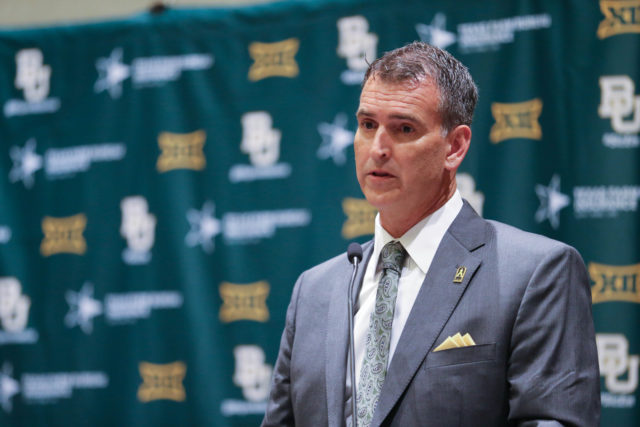By Matthew Soderberg
On Monday, California passed the Fair Pay to Play Act, allowing student-athletes to be paid for their name, image and likeness starting in 2023. National discourse has been flowing heavily on this topic over the past few weeks across the world of college sports, especially since the bill was originally proposed against the NCAA’s advisement.
Mack Rhoades, Baylor’s director of intercollegiate athletics, said his initial reaction was aimed more towards how the bill came about rather than the actual content.
“It bothered me because we, and I’m part of it, should have seen this coming,” Rhoades said. “And I think we could have done a better job when it comes to being proactive. If that bill remains as is, and it does go into effect in 2023, there will be no question some unintended consequences.”
As the idea of paying student athletes has spread, Rhoades’ notion of how to define amateurism has changed.
“I think decisions were made in terms of amateurism for all the right reasons, but as things are changing, we need to be thinking about maybe how we potentially redefine amateurism,” Rhoades said. “I think there are great benefits for those that are student athletes. We talk about all the time the value of a college education, but it goes beyond that. Do I agree with flat – out just paying student athletes? I don’t. [But] is there a way to maybe give them back some money where it doesn’t cross this threshold where you feel like you have pro athletes walking on your campus?”
Since the California bill passed earlier this week, New York, South Carolina and Florida have all introduced similar bills to pay student-athletes. On top of that, Ohio Rep. Anthony Gonzalez plans to introduce a bill to the House of Representatives next week to avoid potential problems with overlapped legislation.
“You can imagine a world where, if there were no guardrails in place, that it could get out of hand pretty quickly. That’s the lane you’re trying to carve. How do you do this to provide necessary and deserved benefits while not inviting a bigger problem alongside it?” Gonzalez said in an interview with ESPN.
With all the different bills flying around, some Big 12 coaches offered up their thoughts on the situation. In an article posted by Sports Illustrated, Oklahoma head football coach Lincoln Riley said that decision-makers need to practice caution throughout this process.
“Hopefully all these individual states, and different people making decisions—governing bodies, our government, anybody that’s involved—I would hope that for the sake of sports and all that’s good with college sports that everybody doesn’t just think about themselves or try to win a vote or this or that,” Riley said. “I hope everybody really thinks about the big-picture view of this because this is a big deal, obviously. We have a great thing going, and hopefully don’t screw it up.”
University of Texas head football coach Tom Herman expressed his support for the payment of student-athletes in the same article.
“They own [their name, image and likeness], and we don’t own it, and they need to be able to use it like anybody. Just like the first-chair trombonist in the jazz band. He can he can go use his name, image and likeness all he wants and promote ‘Johnny’s Trombones’ if he wants to,” Herman said.
These changes are still far off from taking effect, though. The NCAA still has plenty of time to change their stance and regulations, but Rhoades said that if he is asked to help, maintaining the sanctity of the sport is of upmost importance.
“I think first and foremost is that we hold onto the amateurism model. I think that makes college athletics special,” Rhoades said. “Now, that model may need to be tweaked. Maybe the conversation is about how do we potentially tweak that model a little bit, so that we can continue to be about educating student-athletes.”



